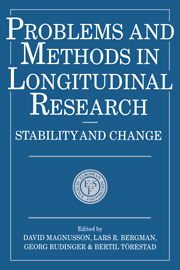Book contents
- Frontmatter
- Contents
- Contributors to this volume
- Foreword
- Preface
- 1 Studying individual development: problems and methods
- 2 Modeling individual and average human growth data from childhood to adulthood
- 3 Intraindividual variability in older adults' depression scores: some implications for developmental theory and longitudinal research
- 4 Now you see it, now you don't – some considerations on multiple regression
- 5 Differential development of health in a life-span perspective
- 6 Assessing change in a cohort-longitudinal study with hierarchical data
- 7 Statistical and conceptual models of ‘turning points’ in developmental processes
- 8 Qualitative analyses of individual differences in intra- individual change: examples from cognitive development
- 9 Application of correspondence analysis to a longitudinal study of cognitive development
- 10 Event-history models in social mobility research
- 11 Behavioral genetic concepts in longitudinal analyses
- 12 Genetic and environmental factors in a developmental perspective
- 13 Structural equation models for studying intellectual development
- 14 Longitudinal studies for discrete data based on latent structure models
- 15 Stability and change in patterns of extrinsic adjustment problems
- Index
Preface
Published online by Cambridge University Press: 27 April 2010
- Frontmatter
- Contents
- Contributors to this volume
- Foreword
- Preface
- 1 Studying individual development: problems and methods
- 2 Modeling individual and average human growth data from childhood to adulthood
- 3 Intraindividual variability in older adults' depression scores: some implications for developmental theory and longitudinal research
- 4 Now you see it, now you don't – some considerations on multiple regression
- 5 Differential development of health in a life-span perspective
- 6 Assessing change in a cohort-longitudinal study with hierarchical data
- 7 Statistical and conceptual models of ‘turning points’ in developmental processes
- 8 Qualitative analyses of individual differences in intra- individual change: examples from cognitive development
- 9 Application of correspondence analysis to a longitudinal study of cognitive development
- 10 Event-history models in social mobility research
- 11 Behavioral genetic concepts in longitudinal analyses
- 12 Genetic and environmental factors in a developmental perspective
- 13 Structural equation models for studying intellectual development
- 14 Longitudinal studies for discrete data based on latent structure models
- 15 Stability and change in patterns of extrinsic adjustment problems
- Index
Summary
Longitudinal research is the main road to fundamental and valid knowledge of living organisms' development. Because the longitudinal approach implies collecting data about the same subjects across time, the demands on the researchers to be accurate and scrupulous are high for several reasons. First, a mistake made at one assessment occasion can seldom be satisfactorily remedied at a later stage. Second, the complexity of information makes it necessary to treat and analyze data with special care.
The importance of issues of methodology and research strategy in longitudinal research is evident from the fact that two of the eight workshops organized by the European Science Foundation's Network on Longitudinal Studies on Individual Development have exclusively dealt with methodology. The first of these was concerned with data quality and resulted in one of the volumes that have come out of the workshop series (see page iv).
This volume emanates from the second methodology workshop, which was held at Soria Moria conference center in Oslo, Norway, April 2-5, 1989. It concentrates on issues that have to do with the intricate task of applying methodological tools which are appropriate to the problem at hand. Two overriding and related concepts are central to longitudinal research: stability and change. In this book these concepts subsume multiple aspects of the human condition: for example, depression, health development, cognitive development, behavior genetics, and adjustment problems. An array of statistical methods is introduced and discussed in relation to the content areas and the problems studied.
Information
- Type
- Chapter
- Information
- Problems and Methods in Longitudinal ResearchStability and Change, pp. xv - xviPublisher: Cambridge University PressPrint publication year: 1991
